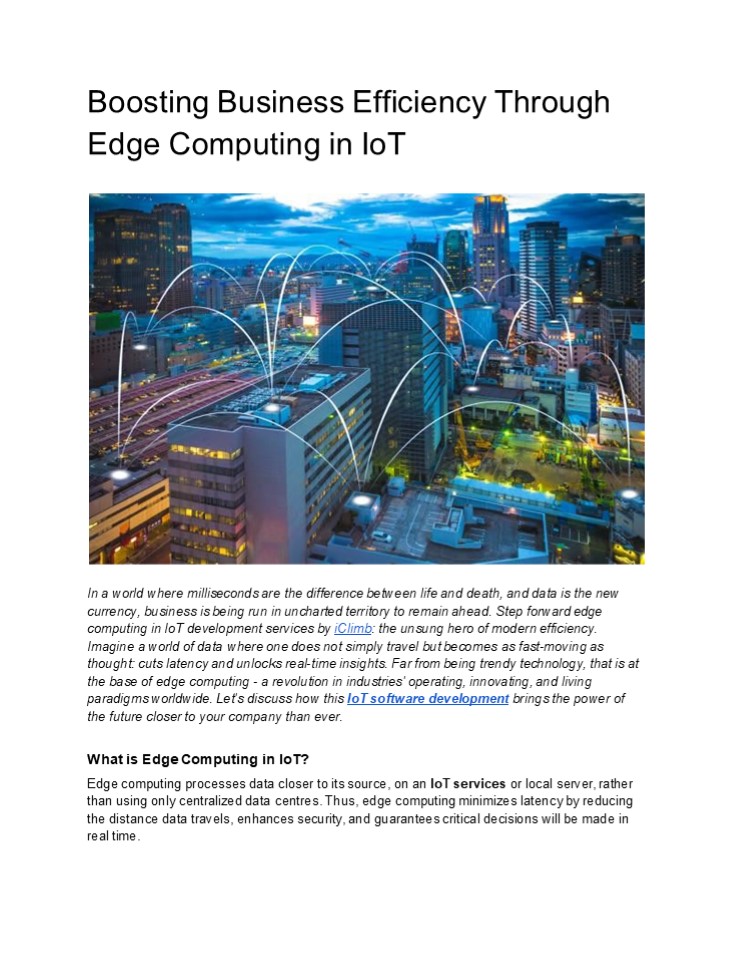Boosting Business Efficiency Through Edge Computing in IoT
Title: Boosting Business Efficiency Through Edge Computing in IoT
1
Boosting Business Efficiency Through Edge
Computing in IoT
In a world where milliseconds are the difference
between life and death, and data is the new
currency, business is being run in uncharted
territory to remain ahead. Step forward edge
computing in IoT development services by iClimb
the unsung hero of modern efficiency. Imagine a
world of data where one does not simply travel
but becomes as fast-moving as thought cuts
latency and unlocks real-time insights. Far from
being trendy technology, that is at the base of
edge computing - a revolution in industries'
operating, innovating, and living paradigms
worldwide. Let's discuss how this IoT software
development brings the power of the future closer
to your company than ever. What is Edge
Computing in IoT? Edge computing processes data
closer to its source, on an IoT services or local
server, rather than using only centralized data
centres. Thus, edge computing minimizes latency
by reducing the distance data travels, enhances
security, and guarantees critical decisions will
be made in real time.
2
- The Need for Edge Computing
- As IoT solution services grow, the sheer volume
of data generated can overwhelm traditional cloud
systems. For example, autonomous vehicles, smart
factories, and healthcare devices need decisions
in a split second. That means any delay of even
milliseconds becomes severe. A strong platform
solution can be achieved through edge computing
by processing and analyzing data on local
machines, significantly boosting operational
efficiency. - Advantages of Edge Computing Over Traditional
Systems - Generally, edge computing is revolutionary
because it promises localized data processing,
unlike the traditional centralized data center.
The uniqueness here is bound to decrease reliance
on stable internet connections while boosting
responsiveness to ensure business operations
take place efficiently, even in the most hostile
environments. - Integration of AI with Edge Computing
- Edge computing has unlocked new dimensions by
combining it with artificial intelligence. AI
algorithms operating locally on the edge device
make decisions more rapid, offer high-end
predictive analytics, and allow better
optimization of resources. Integrating such
domains revolutionizes entire industries, from
self-driving vehicles to customer
personalization. - Benefits of Edge Computing in IoT for Businesses
- Reduced Latency
- Edge computing IoT solution eliminates delays
related to sending data to cloud servers that
could be miles away. This becomes quite important
to companies such as the healthcare industries,
where real-time patient monitoring saves
patients' lives, and manufacturing ensures a
smooth workflow in predictive maintenance. - Enhanced Security and Privacy
- By processing sensitive data locally, edge
computing minimizes the risks associated with
data transfer over networks. The decentralized
approach ensures that data is strengthened in
security and that privacy regulations are met. - Cost Efficiency
- Data transmission to cloud servers is costly when
dealing with large amounts of data. Edge
computing IoT solution optimizes costs by
reducing the need for data transmission and
storage, hence being cost-effective for both big
and small businesses.
3
- Improved Reliability
- Edge computing provides guaranteed continued
functionality when network connectivity fails.
This characteristic is particularly critical in
remote and underserved regions where continuous
connectivity cannot be expected. - Real World Applications of Edge Computing in IoT
- Smart Cities
- IoT network solution in traffic management
systems enables immediate analysis of data coming
from sensors and cameras. In this regard, edge
computing helps manage the flow of traffic,
minimizing congestion. - Retail
- Edge-powered IoT services in retail can help
track the movement of goods and analyze
customers' behaviour and buying patterns to
further tailor shopping experiences. - Healthcare
- Edgy wearable devices, for example, track vital
signs and alert doctors instantly in emergencies. - Manufacturing
- Factory IoT sensors use the edge to predict
equipment failures, optimizing their production
processes. - Future Trends in Edge Computing
- Edge computing is expected to undergo a
tremendous revolution as significant
technological advancements determine how it will
move. The full incorporation of 5G will provide
speed and reduced latency that considerably
improves the functionality of edge devices for
processing data and analyzing it in real time at
unprecedented levels. This is critical for
industries such as autonomous vehicles,
healthcare, and industrial automation, which rely
heavily on real-time data insights.
4
with long-term storage and deep analytics at the
cloud level, offering business owners
flexibility, scalability, and efficiency. Conclu
sion - Edge computing in IoT development
services by iClimb is a technological innovation
and strategic. Businesses adopting this
innovation will achieve unmatched efficiency,
scalability, and customer satisfaction. While
still playing a highly critical role at the edge
of the future-connected world, it continues to
march towards digital transformation, and
whatever your retailing, healthcare, or
manufacturing, here's the ideal time to realize
how this edgy technology redefines business and
gives an essential competitive advantage. Source
Url- https//www.darbaar.com/boosting-business-eff
iciency-through-edge-computing-in-iot/































